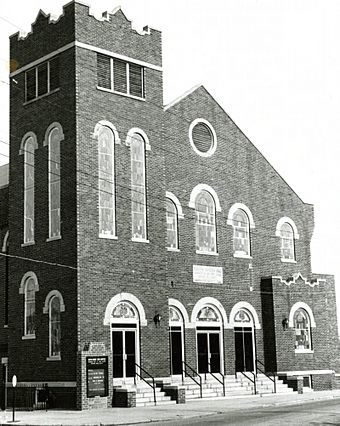Sixth Mount Zion Baptist Church facts for kids
|
Sixth Mount Zion Baptist Church
|
|

Sixth Mount Zion Baptist Church, 1978
|
|
| Location | 14 W. Duval St., Richmond, Virginia |
|---|---|
| Area | 4 acres (1.6 ha) |
| Built | 1867, 1925 |
| Architect | Russell, Charles T.; Boyd, George, et al. |
| Architectural style | Late Gothic Revival |
| NRHP reference No. | 96001445 |
Quick facts for kids Significant dates |
|
| Added to NRHP | December 16, 1996 |
Sixth Mount Zion Baptist Church is a very old and important African-American Baptist church located in Richmond, Virginia. It was started way back in 1867. This church is so special that it was added to the National Register of Historic Places in 1996, which means it's recognized as a significant historical site.
Contents
A Look Back at the Church's History
How the Church Began
The Sixth Mount Zion Baptist Church was founded in 1867 by a man named John Jasper. The church first met in what used to be a stable for horses, located on Brown's Island.
In 1869, the church members moved to a new spot at 14 Duval Street. Later, in the 1880s, a proper church building was added by George W. Boyd.
John Jasper was known for his sermons. In 1878, he gave a very famous sermon at the church called "De Sun Do Move" (The Sun Does Move).
About the Church Building
The church building is a two-story structure made of brick and covered in stucco. It is built in a style called Late Gothic Revival.
A tall tower stands a bit to the side of the main building. This tower holds the church bell in its belfry, which is the part where the bell hangs. It also has a large staircase that leads up to the church's gallery, which is like a balcony inside.
Attached to the main church building is another part called the Jasper Memorial Education Annex. This section has two levels and was added in 1925.
Growing and Changing
In 1925, the church building was updated and made larger. This work was done by an African American architect named Charles Thaddeus Russell.
 | Toni Morrison |
 | Barack Obama |
 | Martin Luther King Jr. |
 | Ralph Bunche |



